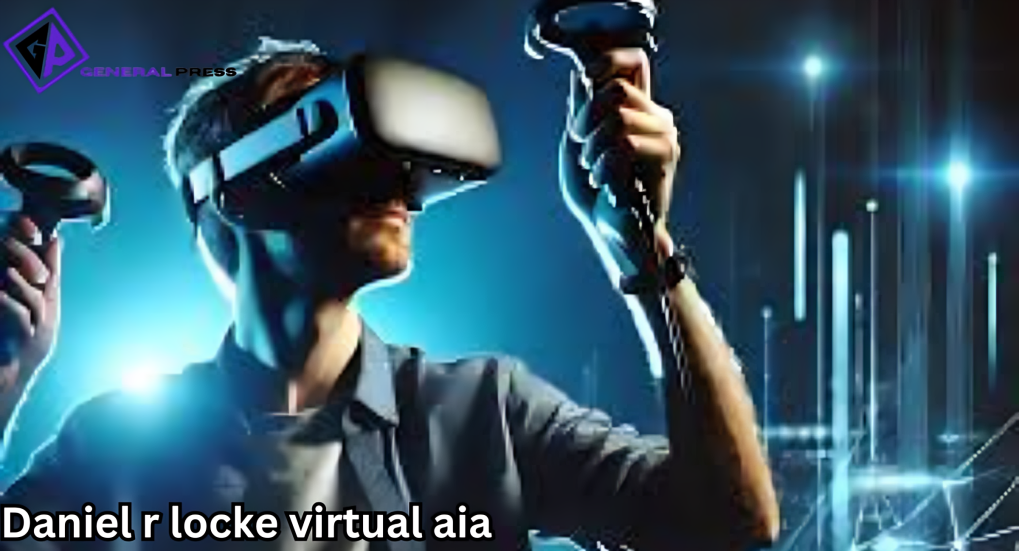In recent years, the rise of artificial intelligence (AI) has brought about profound changes in the way we interact with technology. One of the most exciting advancements in this field is the development of Virtual AI Assistants (AIA). These intelligent systems assist with tasks from productivity to customer service, offering immense potential for various applications. Among the innovators driving this technological revolution is Daniel R. Locke, whose work in the field of AI and Virtual AIA has been groundbreaking. Locke’s contributions are shaping AI’s future, expanding virtual assistants’ capabilities and integrating them into our daily lives.
In this article, we will explore who Daniel R. Locke is, what Virtual AI Assistants are, and how Locke’s work is transforming the landscape of AI technology.
Who is Daniel R. Locke?
Daniel R. Locke is a renowned AI expert, specializing in the development of Virtual AI Assistants, shaping the future of technology. Locke, an AI expert, has significantly advanced virtual assistants, designing systems that are smarter, user-friendly, and more adaptive.
Locke’s work revolves around making AI systems more intuitive and capable of engaging in dynamic, meaningful interactions with users. He has worked extensively on creating AI technologies that are more responsive to human emotions, context, and needs. His approach is unique in that he emphasizes the human side of AI, ensuring that virtual assistants don’t just complete tasks but also offer a more personalized and empathetic user experience.
In addition to his technical expertise, Locke is a strong advocate for the ethical development of AI. He ensures AI systems are fair, transparent, and accountable, addressing biases and unintended consequences in AI technology development.
What are Virtual AI Assistants (AIA)?
Also Read: LoveloLabBlog Codes: Transforming Content Creation for Bloggers
Virtual AI Assistants (AIA) are software applications powered by artificial intelligence that are designed to assist users with various tasks. Tasks range from setting reminders and answering questions to managing schedules, making decisions, and offering personalized recommendations. The goal of an AIA is to understand user intent and respond helpfully, efficiently, and in a human-like manner.
Traditional virtual assistants like Siri, Google Assistant, and Alexa are primarily designed for consumer use, offering voice-activated features such as setting alarms, playing music, or providing weather updates. However, the next generation of AI assistants is much more sophisticated and capable of performing more intricate tasks in various industries, including healthcare, customer service, finance, and more. These advanced AI assistants can handle complex workflows, automate processes, and interact with users in a more nuanced and intelligent way.
What sets Virtual AI Assistants apart from basic voice assistants is their ability to learn and adapt over time. These assistants can analyze user behavior, preferences, and past interactions, allowing them to improve their performance and tailor responses to each user’s unique needs. This adaptability is a key feature of the work Daniel R. Locke has been developing, as it ensures that the AI systems he creates can offer truly personalized support.
Daniel R. Locke’s Vision for Virtual AI Assistants
Daniel R. Locke’s vision for Virtual AI Assistants is one of evolution and improvement. His work is focused on transforming virtual assistants into highly intelligent, context-aware systems that can assist in a variety of professional and personal settings. Locke believes that AI should be more than just a tool for performing tasks—it should be a partner that can enhance the human experience.
Some of the key areas in which Locke has contributed to Virtual AIA technology include:
1. Personalized Interaction
Locke has been a proponent of designing AI systems that understand human emotions and intentions. Traditional AI assistants often struggle to interpret the subtleties of human communication, such as tone, sarcasm, or context. Locke’s work focuses on creating systems that can better understand these nuances, enabling virtual assistants to respond in a more human-like manner. For example, if a user asks a question in a frustrated tone, the AI can detect the emotion and respond with empathy, rather than a robotic or impersonal reply.
By integrating natural language processing (NLP) and sentiment analysis into his AI systems, Locke’s virtual assistants are able to engage in more meaningful, personalized conversations with users. This level of emotional intelligence allows AI to become a more effective assistant, whether it’s managing a calendar, answering inquiries, or providing support during stressful situations.
2. Adaptive Learning and Continuous Improvement
One of the most exciting aspects of Locke’s work is the focus on creating AI systems that are capable of learning and adapting over time. Traditional AI assistants require frequent updates and reprogramming to improve their performance, but Locke’s virtual assistants are designed to be self-improving. They can analyze past interactions with users, detect patterns, and make adjustments to improve future responses.
For instance, if a user regularly asks about specific topics, the virtual assistant can adapt its responses to provide more relevant and accurate information. This continuous learning process ensures that the assistant becomes more efficient and intuitive the more it interacts with the user. Locke’s approach is helping to pave the way for AI systems that are not just reactive, but proactive in anticipating and addressing user needs.
3. Seamless Integration Across Industries
Another area where Locke’s contributions are making a significant impact is in the integration of Virtual AIA across various industries. AI-powered assistants are becoming increasingly important in sectors like healthcare, finance, and customer service, where they can automate routine tasks, manage workflows, and provide real-time support.
In healthcare, for example, virtual assistants can assist with scheduling appointments, managing patient data, and even offering personalized health recommendations. In customer service, AI assistants can handle customer inquiries, troubleshoot issues, and provide product recommendations, all while offering a personalized experience.
Locke’s work in creating highly adaptable AI systems means that virtual assistants can be tailored to meet the specific needs of different industries. Whether it’s a healthcare provider, a retail business, or a financial institution, Locke’s virtual assistants can be integrated seamlessly into existing workflows, offering real-time support and enhancing efficiency.
4. Ethical Considerations in AI Development
As AI becomes more pervasive in our lives, ethical concerns around bias, privacy, and accountability are becoming more pressing. Daniel R. Locke is a strong advocate for responsible AI development, ensuring that the virtual assistants he helps create are transparent, unbiased, and ethically sound. He works to ensure that AI systems do not perpetuate harmful stereotypes or make biased decisions based on flawed data.
Locke’s commitment to ethical AI is especially important as virtual assistants become more involved in critical decision-making processes, such as healthcare diagnostics or financial recommendations. By addressing these ethical concerns early in the development process, Locke is helping to build AI systems that can be trusted and used responsibly.
FAQs:
1. Who is Daniel R. Locke?
Daniel R. Locke is a leading expert in artificial intelligence and the developer of groundbreaking advancements in virtual AI assistants (AIA). With a background in AI research and development, Locke has played a pivotal role in shaping the future of AI-driven technologies.
2. What are Virtual AI Assistants (AIA)?
Virtual AI Assistants (AIA) are intelligent systems designed to assist with tasks, answer questions, and manage schedules, much like traditional virtual assistants but enhanced with cutting-edge artificial intelligence. These assistants can learn and adapt to individual needs over time, offering personalized, real-time assistance.
3. How is Daniel R. Locke influencing the development of AI Assistants?
Daniel R. Locke is pushing the boundaries of AI by creating virtual assistants that are not only more intuitive but also capable of understanding human emotions, context, and preferences. His work focuses on making AI assistants more interactive, human-like, and adaptable for both personal and professional use.
4. What is the future of Virtual AI Assistants according to Daniel R. Locke?
Locke envisions a future where virtual AI assistants become fully integrated into everyday life, assisting with everything from managing tasks and schedules to enhancing personal well-being and facilitating deeper human-computer interactions. He sees AI assistants evolving to be more context-aware, emotionally intelligent, and capable of complex decision-making.
5. How will Virtual AI Assistants impact businesses and industries?
Locke believes that AI assistants will revolutionize industries by improving efficiency, automating routine tasks, and enabling more personalized customer experiences. From streamlining administrative functions to aiding in advanced data analysis, businesses will rely on AI assistants to handle an increasing range of functions.
The Future of Virtual AI Assistants
Looking ahead, the potential for Virtual AI Assistants is limitless. As AI technology continues to advance, virtual assistants will become even more intelligent, versatile, and integrated into our lives. With innovators like Daniel R. Locke leading the way, the future of AI holds exciting possibilities for transforming the way we work, communicate, and live.
Locke’s vision for AI is one where virtual assistants are not just tools, but essential partners in navigating our increasingly complex world. By prioritizing human-centered design, adaptive learning, and ethical development, Locke is shaping a future where AI is a force for good, enhancing productivity, creativity, and overall quality of life.
In conclusion, Daniel R. Locke’s work with Virtual AI Assistants is redefining the role of artificial intelligence in our society. His contributions are helping to create smarter, more personalized, and more ethical AI systems that will continue to transform industries and improve the way we interact with technology for years to come.




